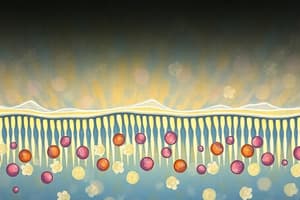Podcast
Questions and Answers
Which of the following is true about passive transport?
Which of the following is true about passive transport?
- It requires energy to move substances across cell membranes
- It relies on the second law of thermodynamics to drive movement (correct)
- It depends on the permeability of the cell membrane
- It moves substances from an area of low concentration to high concentration
What is the driving force behind diffusion?
What is the driving force behind diffusion?
- Cellular energy
- Concentration gradient (correct)
- Entropy of the overall system
- Permeability of the cell membrane
Which of the following is a type of passive transport?
Which of the following is a type of passive transport?
- Endocytosis
- Exocytosis
- Osmosis (correct)
- Active transport
Which type of transport requires a transport protein to assist the substance through the membrane?
Which type of transport requires a transport protein to assist the substance through the membrane?
What drives glucose across the cell membrane through GLUT2 in facilitated diffusion?
What drives glucose across the cell membrane through GLUT2 in facilitated diffusion?
Which type of solution has a balanced solute concentration inside and outside the cell?
Which type of solution has a balanced solute concentration inside and outside the cell?
What happens to a cell in a hypotonic solution?
What happens to a cell in a hypotonic solution?
Which of the following is true about passive membrane transport?
Which of the following is true about passive membrane transport?
What is the driving force of passive membrane transport?
What is the driving force of passive membrane transport?
Which of the following describes osmosis?
Which of the following describes osmosis?
What is the main difference between simple diffusion and osmosis?
What is the main difference between simple diffusion and osmosis?
Flashcards are hidden until you start studying




